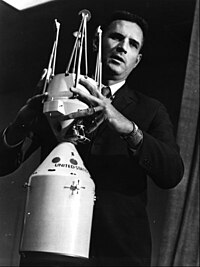Portal:Spaceflight/Selected biography/11
Joseph Francis Shea (September 5, 1925 – February 14, 1999) was an American aerospace engineer and NASA manager. Born in the New York City borough of the Bronx, he was educated at the University of Michigan, receiving a Ph.D. in Engineering Mechanics in 1955. After working for Bell Labs on the radio inertial guidance system of the Titan I intercontinental ballistic missile, he was hired by NASA in 1961. As Deputy Director of NASA's Office of Manned Space Flight, and later as head of the Apollo Spacecraft Program Office, Shea played a key role in shaping the course of the Apollo program, helping to lead NASA to the decision in favor of lunar orbit rendezvous and supporting "all up" testing of the Saturn V rocket. While sometimes causing controversy within the agency, Shea was remembered by his former colleague George Mueller as "one of the greatest systems engineers of our time".
Deeply involved in the investigation of the 1967 Apollo 1 fire, Shea suffered a nervous breakdown as a result of the stress that he suffered. He was removed from his position and left NASA shortly afterwards. From 1968 until 1990 he worked as a senior manager at Raytheon in Lexington, Massachusetts, and thereafter became an adjunct professor of aeronautics and astronautics at MIT. While Shea served as a consultant for NASA on the redesign of the International Space Station in 1993, he was forced to resign from the position due to health issues.

